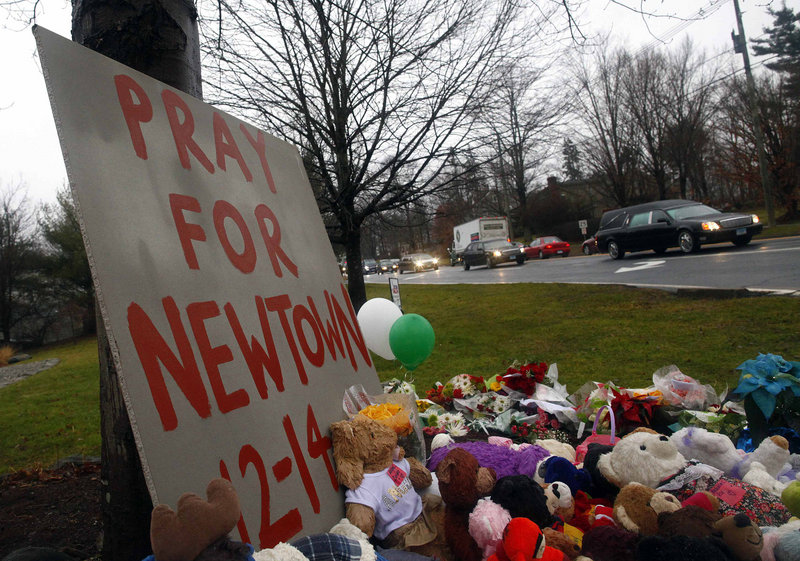Maine lawmakers expect a wave of gun control bills in response to the shootings at an elementary school in Connecticut that claimed 26 lives, including 20 children.
But even as the massacre prompts calls for adding background checks or limiting the bullet capacity of some firearms, such legislation faces an uphill battle in a state that has rejected similar measures and recently loosened its gun laws.
In the last two-year session, the Legislature passed a law that allows holders of concealed-weapons permits to stow guns in their vehicles on public property, including parking lots at the Capitol complex in Augusta, prisons and courthouses.
And, over objections from the Maine State Chamber of Commerce, it passed a companion bill allowing employees with concealed-weapons permits to leave guns locked in their cars at work.
The legislation is somewhat less controversial than proposals in other parts of the country, such as allowing guns on college campuses. Nonetheless, Maine has been part of a national momentum behind pro-gun bills.
Gun control advocates say the time to ban assault weapons is now.
Advocates held a vigil Sunday night in Portland stressing that point. They also called for state reforms, including background checks for purchases at gun shows and private sales, and limiting the size of firing magazines.
Thomas Franklin, a board member with Maine Citizens Against Handgun Violence, urged lawmakers to stand up to the National Rifle Association. Franklin said Maine could show the nation that “grief can be turned into action.”
The recent loosening of Maine gun laws was overseen by a Republican-led Legislature. While Democrats have regained the majority, new leaders so far appear cool to any overhaul of Maine’s gun laws.
In a written statement, Senate President Justin Alfond, D-Portland, said there isn’t a simple answer to the mass killings, but a solution involves “law enforcement, educators, mental health providers and family members.”
Ericka Dodge, Alfond’s spokeswoman, said that although last week’s shootings created a cultural tipping point for action, “this isn’t just about guns.”
Other Democratic lawmakers agreed.
Rep. Mark Dion, D-Portland, a former Cumberland County sheriff, said that while there are “holes” in the state policies governing access to firearms, filling them would address only part of the problem.
“The real theme here is that violence is the default answer to some people affected by mental illness,” said Dion.
Suggestions of a multi-pronged policy approach echo the discussion at the national level. Despite President Obama’s recent vow to prevent future mass killings, his administration has indicated that gun control won’t be the only focus.
Jay Carney, Obama’s press secretary, told reporters Monday that gun violence is “a complex problem that will require a complex solution.”
Gun control advocates blame the deep-pocketed National Rifle Association and its influence on state and federal lawmakers for a proliferation of pro-gun laws amid increasing examples of violence.
The Sunlight Foundation reported Monday that the NRA spent more than 4,100 times as much on this year’s federal elections as the nation’s leading gun control group, the Brady Campaign to Prevent Gun Violence, $24.3 million to $5,816. And the NRA has spent 73 times more than the Brady Campaign lobbying the 112th Congress.
In Maine, the NRA’s political action committee has spent over $137,200 on state legislative elections since 2002. The Sportsman’s Alliance of Maine, primarily a hunting advocacy group that is not always aligned with NRA interests, has spent over $175,000.
Richard Dyke, who once owned Bushmaster Firearms in Windham, has spent over $68,000 on Maine elections and legislative candidates.
By contrast, the political arm of Maine Citizens Against Handgun Violence has spent $9,228 since 2002.
Maine Citizens Against Handgun Violence has spent more lobbying state lawmakers than the NRA has since 2002, $43,799 to $29,125. The Sportsman’s Alliance of Maine has spent $110,039 over the same period.
It’s not clear whether Maine lawmakers have made a political calculation to acquiesce to the pro-gun lobby. What is clear is that stricter gun-control bills have not gone very far in Maine, with either party in control.
In 2009, the Democratic-led Legislature rejected a bill that would have forced sellers at gun shows to do background checks on buyers before selling them firearms. The bill died in committee without a vote in the House or the Senate.
Other bills, such as requiring dealers to provide trigger locks on handguns and banning assault weapons, have been defeated.
Rep. Kenneth Fredette, R-Newport, the House Republican leader, said Maine’s gun laws reflect the values of its residents. He said it is appropriate to have a discussion about what caused the tragedy in Connecticut, but the dialogue shouldn’t begin and end with taking guns from law-abiding citizens.
Sen. Anne Haskell, D-Portland, said she expects that lawmakers will see a host of gun control bills in this session. And Haskell, a gun owner and hunter who has a concealed-weapons permit, said the proposals will go beyond an emotional response to the killings.
“I don’t want people to end up with a false sense of security,” she said. “I don’t think there’s an easy solution until we can understand what drives somebody to go to a school, deliberately target children. It surpasses any kind of understanding.”
David Trahan, executive director of the Sportsman’s Alliance of Maine, said his group would give thoughtful consideration to any proposal.
The alliance already partners with gun control groups to promote voluntary background checks and gun safety education.
However, Trahan said, lawmakers should be wary of people seizing on tragic events to advance laws that infringe on citizens’ Second Amendment rights.
Staff Writer Steve Mistler can be contacted at 791-6345 or at: smistler@mainetoday.com
Send questions/comments to the editors.



Comments are no longer available on this story